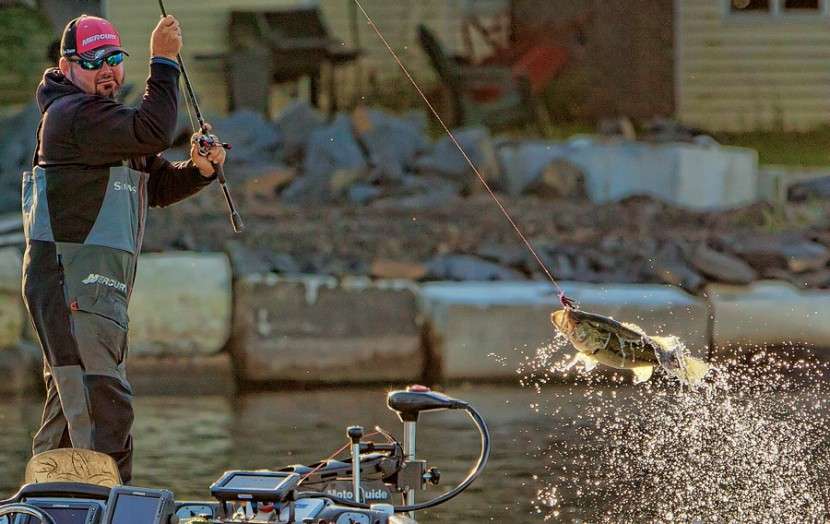
Every so often I get a question about how I handle jumping bass. I think the idea behind it is that a bass that jumps after it’s hooked is a bad thing. That isn’t always the case.
There’s nothing more beautiful than a largemouth or smallmouth that tailwalks across the surface as you’re fighting it. There’s a chance you might lose it but, unless it’s the fish of a lifetime, it’s probably worth the risk. My advice: enjoy the experience. It’s a part of fishing.
If you’re a tournament angler, you see things differently. You want that fish in the livewell. You’re interested in its weight, not the beauty of its jump.
Either way, there are some things about jumpin’ bass you should know and keep in mind.
First of all, you should think about how you pull against the fish. A fish doesn’t try to swim away from you because it knows you’re there or to get away from you. It swims away because it’s swimming against the pull of the rod and line.
That’s a natural instinct. Humans do the same thing. If someone grabs your arm, you jerk it away from him or her without thinking about what to do or how to get away. You just do it.
If you pull down on a fish, it’s more likely that it’ll swim towards the surface. You can make a jump less likely if you pull straight back, or sometimes even up a little bit. Don’t create a problem by pulling down as hard as you can. You’ll rarely have enough leverage to keep the fish from getting to the surface and jumping, anyway.
Another thing to think about is what kind of lure you’re using and what kind of hooks are on it. A lure with treble hooks will come out much more easily that one with a single barb. That’s the reason bass come unbuttoned more often with crankbaits and bladebaits and less often with jigs and buzzbaits.
Lure weight matters, too. Bladebaits and lipless crankbaits will come out more easily than a lot of other lures because when the bass shakes his or her head on the jump the lure flops back and forth. The weight of the lure helps the bass free itself from the hooks.
The last thing you should consider is the season of the year. I’m no fisheries biologist, but I have caught a few of them over my 20 plus year career. It seems to me that spring and summer bass are softer than fall and winter bass.
It’s harder to get a secure hookset in the spring or summer than it is in the fall or winter. The hook(s) come out easier. Because of that spring and summer bass get loose more often than fall and winter bass.
Despite all I’ve said — or maybe because of it — I have to say that the best way to get them to the boat is to wind them in without playing with them or trying to outsmart them. I’ve lost a heck of a lot more bass by thinking than I have by cranking.





